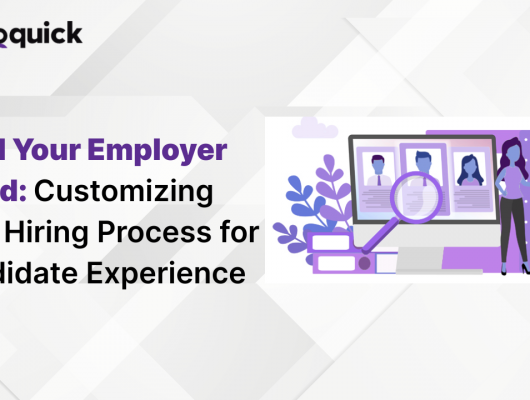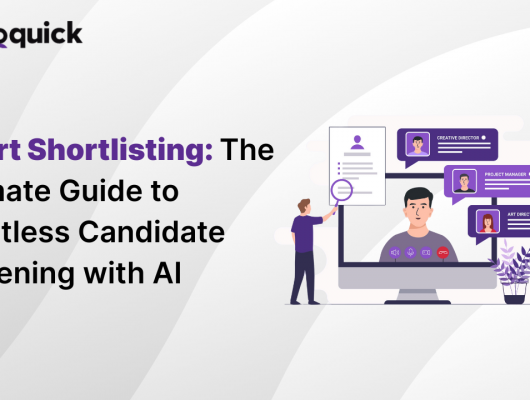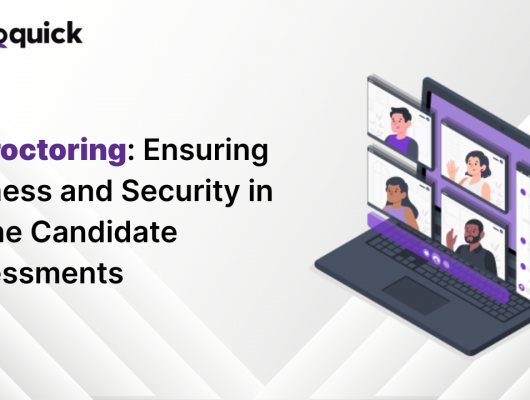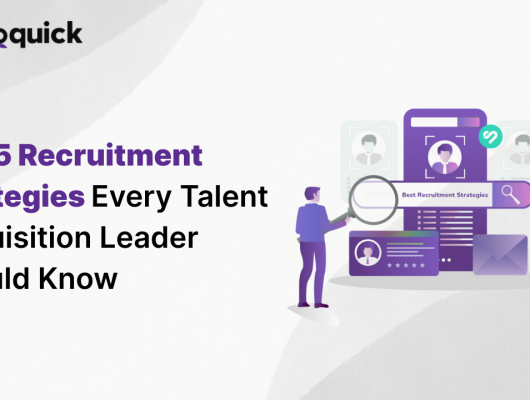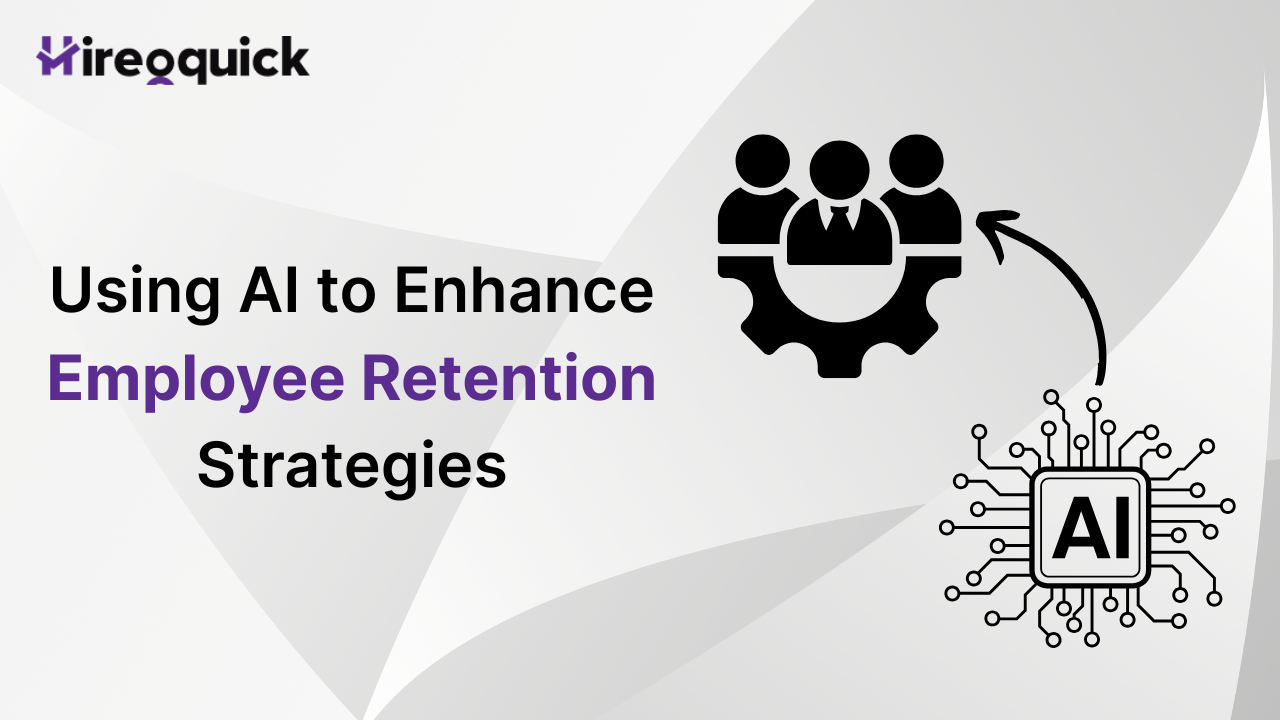
Employee retention has always been one of the most significant challenges faced by organizations, especially in today’s competitive job market. The cost of turnover is high—not only in terms of direct expenses like hiring and training new employees but also in lost productivity and the potential impact on team morale. Companies that manage to retain their top talent enjoy better stability, higher employee morale, and a more positive workplace culture. As businesses evolve, AI is increasingly being leveraged to enhance employee retention strategies and mitigate the effects of turnover.
With AI to employee retention, organizations can now predict potential turnover, identify disengaged employees, and create tailored strategies that help retain their best talent. This blog explores how AI can be used to improve retention, reduce turnover, and foster an environment that encourages long-term employee commitment.
Using AI to enhance employee retention strategies is revolutionizing the way companies approach workforce management. By leveraging AI-driven tools, businesses can better understand employee satisfaction, predict turnover, and create personalized retention plans. AI algorithms analyze various data points, such as employee performance, engagement levels, and feedback, to identify at-risk employees and intervene proactively. Additionally, AI can help companies tailor career development programs, recognition systems, and work-life balance initiatives to individual needs, ultimately fostering a more supportive and rewarding work environment. Through predictive analytics and machine learning, organizations can not only retain top talent but also create a positive culture that encourages long-term employee loyalty. AI’s ability to provide real-time insights and scalable solutions enables businesses to implement more effective retention strategies that align with the evolving needs of the workforce.
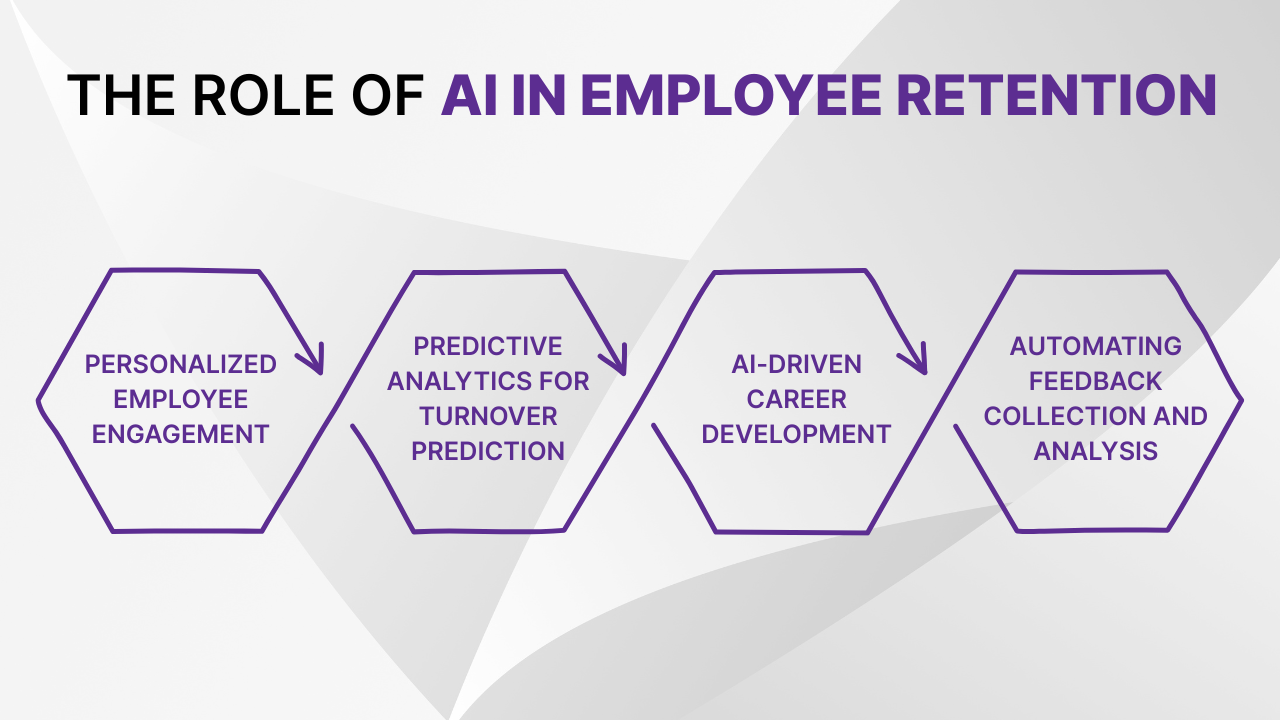
The Role of AI in Employee Retention
Artificial intelligence has already made waves in various industries, and HR is no exception. By analyzing vast amounts of data, AI enables organizations to make informed decisions regarding employee engagement, performance, and retention. One of the key ways AI is used in employee retention is through predictive analytics, where AI tools forecast employee turnover based on patterns such as job satisfaction, performance, and other behavioral indicators. According to a report from Harvard Business Review, data-driven insights help organizations take proactive measures to retain top talent (source).
By automating routine tasks and identifying at-risk employees early, AI allows HR teams to create more personalized retention strategies that cater to the unique needs of their workforce. These tools are transforming traditional retention methods, helping businesses save costs, reduce turnover, and build a more loyal workforce.
Predictive Analytics for Turnover Prediction
One of the most valuable applications of AI in employee retention is its ability to predict which employees might be at risk of leaving. AI algorithms can analyze historical data such as employee performance, job satisfaction, compensation, and career development to predict the likelihood of an employee quitting. By identifying at-risk employees early on, companies can take proactive measures to retain them before it’s too late.
For example, AI can analyze employee engagement scores, absenteeism rates, and work patterns to identify trends that typically precede voluntary resignations. This allows HR teams to intervene and address potential issues, whether it’s by offering additional training, providing more flexible working conditions, or having one-on-one conversations with the employees to understand their concerns.
Personalized Employee Engagement
Engaged employees are more likely to stay with the company. AI allows businesses to tailor engagement strategies to individual employees, making them feel valued and heard. By using data collected from surveys, feedback, and performance reviews, AI can provide personalized recommendations on how to improve engagement.
For example, AI tools can identify whether an employee feels underappreciated, lacks career development opportunities, or is experiencing a poor work-life balance. With this insight, managers can offer customized solutions, such as mentorship programs, additional learning opportunities, or a better work schedule, to enhance job satisfaction and retention.
Automating Feedback Collection and Analysis
Gathering employee feedback is crucial for identifying areas that may be contributing to dissatisfaction or disengagement. AI-powered systems can automate the process of collecting and analyzing feedback through surveys, interviews, or sentiment analysis. These systems can provide real-time insights into how employees feel about their job, the workplace environment, and their relationships with colleagues and management.
By continuously monitoring employee feedback, AI can identify patterns that might be missed in traditional feedback methods, helping HR teams address issues promptly. This process not only saves time but also creates a culture of continuous improvement where employees feel valued and heard.
AI-Driven Career Development
Career growth is a key factor in employee retention. When employees see a clear path for advancement, they are more likely to stay with the company. AI can help create personalized career development plans by analyzing employees’ skills, interests, and performance. Based on this data, AI tools can recommend relevant training, job rotations, or stretch assignments that align with the employee’s goals and aspirations.
By leveraging AI, companies can ensure that employees have access to the resources they need to grow within the organization, which helps increase their long-term commitment.
How AI Can Enhance the Employee Onboarding Process
Effective onboarding plays a critical role in employee retention. A strong onboarding process ensures that employees feel welcomed, supported, and ready to succeed in their new roles. AI can optimize the onboarding process by personalizing it to the needs of each employee, offering interactive training, and providing real-time feedback.
AI can also automate administrative tasks, such as document management and policy acknowledgments, allowing HR tech teams to focus on the more personal aspects of onboarding. Personalized onboarding experiences created through AI-driven systems can help employees feel more connected to the organization from day one, improving retention rates right from the start.
Leveraging AI and Automation for Employee Recognition
Employee recognition is another vital aspect of employee retention. Employees who feel valued are more likely to stay engaged and committed to their work. AI can enhance employee recognition by analyzing performance data and identifying employees who consistently meet or exceed expectations. Automated recognition programs can be set up to deliver personalized rewards or acknowledgment messages to employees, ensuring that good work is celebrated promptly.
AI tools can even go a step further by identifying employees who might be feeling undervalued, based on performance or engagement data. Managers can then take proactive steps to show appreciation and ensure these employees feel supported.
Improving Work-Life Balance with AI
Work-life balance is increasingly becoming a critical factor in employee retention. Companies that offer flexible working arrangements or support employees in managing their personal and professional lives tend to retain top talent for longer. AI can help businesses monitor work-life balance by analyzing factors such as overtime hours, productivity patterns, and employee feedback.
AI-powered systems can help managers identify when employees are overworked or showing signs of burnout. By automating alerts or reminders for managers to check in with their teams, AI ensures that companies maintain a healthy work-life balance for their employees, ultimately improving retention.
HireOquick: AI to Enhance Employee Retention
As an AI-powered platform, HireOquick offers innovative solutions that not only help with recruitment but also play a pivotal role in enhancing employee retention. The platform uses AI to analyze employee performance data, engagement scores, and other key metrics to provide actionable insights that can improve retention strategies.
With HireOquick, businesses can track employee satisfaction, identify trends that lead to high turnover, and offer personalized solutions to enhance retention. By utilizing AI for both recruitment and retention, organizations can create a more engaged and loyal workforce.
Some of the key features of HireOquick that can enhance employee retention include:
- AI-Powered Performance Tracking: Monitor employee performance and engagement in real-time to identify areas for improvement.
- Customized Training and Development Plans: Create tailored career development paths that align with employees’ goals, helping them grow within the company.
- Sentiment Analysis: Analyze employee sentiment through feedback and surveys, helping managers take proactive steps to improve job satisfaction.
- Automated Recognition: Deliver personalized employee recognition based on performance data, ensuring employees feel valued.
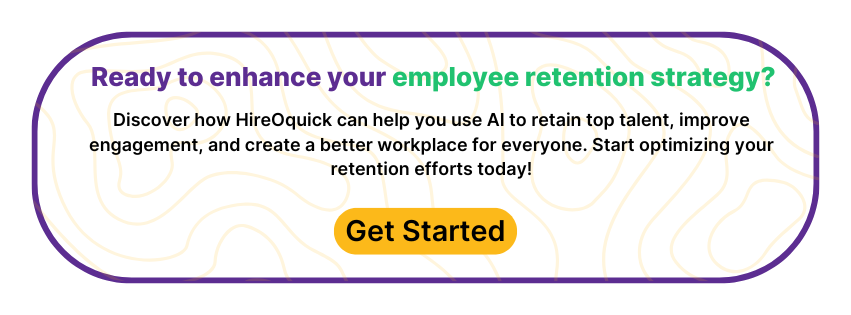
The Future of AI in Employee Retention
As AI continues to evolve, so will its role in employee retention. The future of AI in HR is focused on creating even more personalized, data-driven strategies that ensure employees feel supported, valued, and engaged. Whether it’s through better predictive analytics, automated feedback loops, or tailored career growth opportunities, AI will continue to be a game-changer for businesses aiming to retain their top talent.
Moreover, AI will increasingly enable companies to make better, more informed decisions about workforce planning, helping them create environments that promote long-term employee satisfaction and loyalty.
Conclusion
Employee retention is one of the most significant challenges businesses face, but AI is changing the game. By leveraging AI to predict turnover, personalize engagement strategies, and provide actionable insights, businesses can create a more fulfilling work environment for their employees. From automating feedback collection to offering tailored career development, AI is revolutionizing how companies approach retention.
If you want to ensure that your company retains its top talent and maintains a high level of employee satisfaction, adopting AI-driven tools like HireOquick can be a key part of your strategy. By combining AI and automation, businesses can create a culture of continuous improvement that benefits both employees and employers alike.

